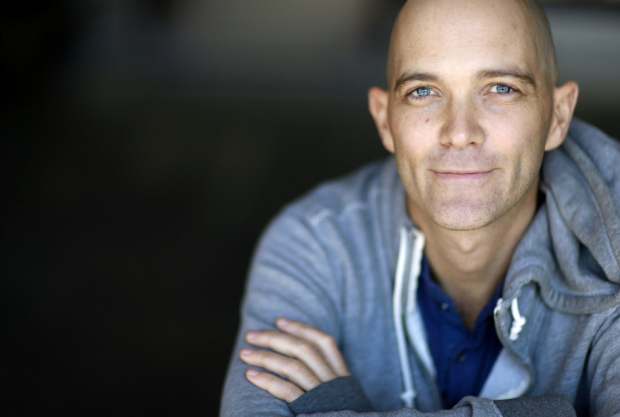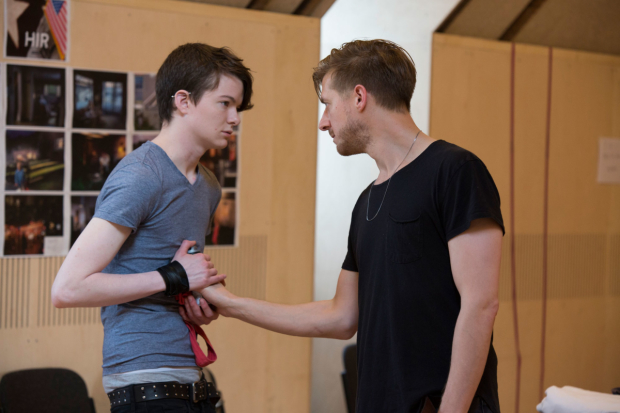Taylor Mac: 'The ancient Egyptians were making avant-garde theatre long before us'
As Taylor Mac’s play ”Hir” receives its UK premiere, the author and performance artist explains where the inspiration for it came from, starting out in the industry and recovering from ”A 24-Decade History of Popular Music”

American performance artist, actor and writer Taylor Mac has been breaking theatre and culture boundaries throughout his 20-plus year career. Last year Mac performed the radical 24 hour piece A 24-Decade History of Popular Music in full for the first time for audiences in New York. The immersive show, which sees Mac on stage the entire time, consists of 246 songs and 13 hours of text which re-frames and re-enacts 240 years of US history. It won the New York Drama Critics’ Circle Special Award, an Obie Award and was a Pulitzer Prize finalist for drama. Mac, who prefers to use the gender pronoun judy, has written seventeen plays, including Hir. Pronounced Here, the play is being staged in the UK for the first time at the Bush Theatre in London this week, directed by Nadia Fall and starring Arthur Davill and Griffyn Gilligan. Here Mac explains a little about where the play came from, what it’s like having work staged without being involved and recovering from the 24-hour marathon.
People have described Hir as ‘tearing apart’ the kitchen sink drama, would you describe it like that?
I don't think of it too much as a deconstruction of a kitchen sink drama. In my work, content always dictates the form. In Hir I’m talking about a culture that is trying to break out of something that it used to be, into something a little surprising, fresh, healthier and more alive. To me, the form that best represented that was the [theatre] form that we are stuck in right now: that fourth wall, kitchen sink family play. But Hir is not meta, so we’re not doing a deconstruction of it. Although the characters do feel like they are pressing up against the invisible blast of the fourth wall. Two of them are really trying to get out and see what happens and another character is trying to bring them back in.
What happens in the play?
The story is about the prodigal son returning home from war and everything being different from when he left. His father, who ruled the family with an iron first, has had a stroke and is no longer able to abuse everybody. His mother, who was abused her whole relationship by his father, is suddenly free and in charge and thriving as a result. His sister is no longer his sister, but is transitioning – trans male is probably the best way to describe what the character is moving towards. The household used to be really orderly and now it’s a disaster because the mother sees picking up as part of the patriarchy. The soldier son has been traumatised by war and comes home and he wants order. Each of them are saying – you need to heal my way, which creates problems. Problems called Donald Trump!
Is that what inspired you to write the play? The current state of America?
I started writing this play 17 years ago. It was even before all this polarization. I call it my drawer play. I would write a little bit, put it back, take it out and write it again. I don’t have another drawer play because all the other things I write I just finish them and move on to the next project. But this one was lingering for a long time. When I started, it was so much about growing up in and then leaving Stockton, California. Stockton was one of the more unhealthy places in the US to grow up, and after I left the statistics just stayed the same, and it made me think about my responsibility to stay. If we all leave, how does it get better?

© Ellie Kurttz
So the play reflects a little of where the States is at the moment?
It’s a kind of microcosm for the United States, which is a kind of microcosm for much of the world. We’re in this weird transition between something progressive and something nostalgic. It has a lot to do with our desire to want to make the world a better place, but nobody really figures how to reconcile that with the fact that the way some people progress is not necessarily how other people can.
Is it funny?
It is very funny, yeah, it’s primarily funny, until it’s not.
Have you had much connection with the creative team over here?
I haven’t unfortunately, I really wanted to come and be part of the process. I have performed my performance art in the UK, but I have never had one of my plays performed there. So I felt I should go over and be involved. But it’s a really busy time of my life right now.
How did you feel when they approached you about staging it?
I was really happy. It’s a new phase for me, where you trust people to take care of your babies. But I hear that the Bush is wonderful and Nadia [Fall] has such a wonderful reputation. So I thought: 'well, – go for it'. It is a little nerve wracking, but at the same time it’s thrilling to let it go and let people make what they make.
You are very specific about having the gender queer character played by an actor who is trans gender, why is that?
Yes. There are a few reasons for that. My personal feeling is, regardless of what actors are capable of, that combination of the character and the actor going through something – even if it is a totally different experience of it – elevates the art. That’s exciting to me. Then there’s an ethical reason, which is that trans performers don’t get opportunities – I know what it's like to not get opportunities as a performer because of how people initially view you. The show is being produced in 20 productions all over America which means 20 trans actors who never would have had access to those theatres have access to them. That’s pretty cool.
You’re primarily known for being onstage rather than off, but you have written a lot of plays too – how did you start?
I started as an actor. I went to acting conservatory and then I would get these jobs which over here are called regional theatre jobs. I would go to some small town and act in a production of The Little Foxes, for example, and I wouldn’t know anyone in the town. So I had a lot of alone time and I started writing. I fell in love with it and continued. I’ve been writing for 22 years. The performance art came later. I couldn’t quite convince the American theatre to do the things I wanted to do, so I went to the clubs. And the clubs would let you do anything. So I started creating this performance art theatre and now what I do is a little bit of everything. Sometimes I act, sometimes I don’t, sometimes I wear crazy outfits on a stage, sometimes I am wearing what people would consider a normal costume. But it’s all a mix up. That to me is what a life in the theatre is all about.
You recently performed your 24 hour marathon show A 24-Decade History of Popular Music in full in New York. How do you come back from something like that – both artistically and emotionally?
I’m still figuring it out. It’s been a bit hard to tell because of the election and the state of the world. Plus a show I’ve been working on for a really long time ended and I also had a death in the family. It’s hard to know what emotion is assigned to what right now. I am slowly finding my way back in. I am lucky because it’s a good time in my career for it to happen. I’m at a place where I don’t have to prove myself anymore. The recovery has been about spending more time thinking, meditating, relaxing and trying to hang out with friends. Not trying to match this massive thing that we made that can never be matched because it’s never been done in the history of world theatre. People have done 24 hour shows, but nothing like this. I am so happy we made it and we have begun touring it in full. So it’s really thrilling.
How did you feel about the show becoming a Pulitzer finalist?
It was nice. I had thought there was no way they would ever consider it, because I think of it as a play, but a lot of Americans don't have expansive understandings of what theatre can be so I didn't bother submitting it. But they called and asked us to. It’s a fascinated thing to consider that 24 Decade is actually closer to the original form of theatre than what we think of as a play today in terms of what Egyptians put into their festivals. So it's interesting that what we think of as traditional is actually new. And that the avant-garde is actually pretty old.
Hir runs at the Bush Theatre from 20 June to 22 July with previews from now.













